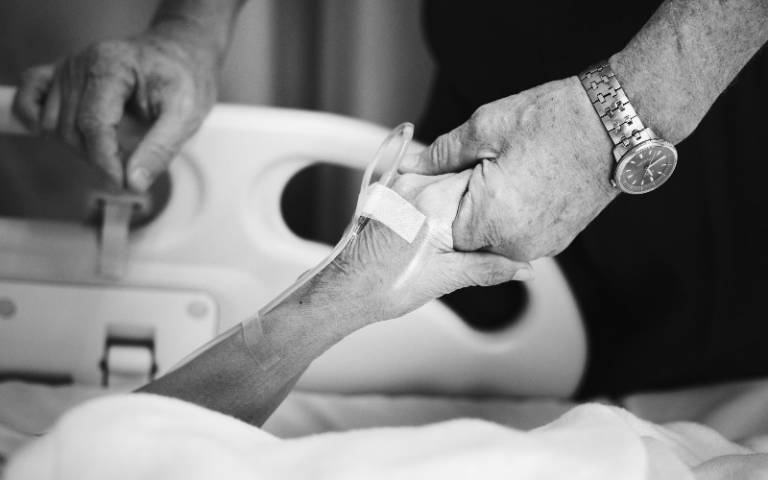How doctors recognise when a patient is dying
27 November 2018
A UCL-led research team has identified the key signs and symptoms that expert palliative care doctors use to recognise when terminally ill patients are imminently dying.

The findings, published in BMJ Open, builds on the team’s research finding last year that some doctors are frequently inaccurate when predicting how long those living with terminal illnesses will survive. The previous study revealed a wide variation in errors, ranging from an underestimate of 86 days to an overestimate of 93 days.
“Being able to accurately predict when a patient is likely to die is important as it lets patients and their families prepare for the death, and it enables health professionals to make sound decisions about palliative care. After discovering that many clinicians’ predictions are not accurate enough, we wanted to understand how to improve these predictions, to inform clinical practice,” said the study’s lead author Dr Nicola White (Marie Curie Palliative Care Research Department at UCL).
The NICE guideline ‘Care of dying adults in the last days of life’ describes the recognition of imminent death as an essential first step towards improving care for dying patients. However, it does not clearly explain how clinicians are expected to identify such patients or offer advice about less experienced doctors can learn or improve their clinical skills in this area.
The team’s new study set out to, first, identify a group of palliative care doctors who had particular expertise at recognising when a patient is dying. Those doctors volunteered to complete an online test, in which they were presented with 20 real case studies of patients who had been referred to a hospital or hospice for palliative care. The doctors were asked to decide whether the patient was close to death or not, and the results enabled researchers to identify the top 20% of participants who were most accurate at predicting when the patients would die.
The ‘top performers’ were then presented with an additional 50 cases of hypothetical patients and were again asked to estimate the probability of death within the next 72 hours. Based on the decision-making of this expert group, the researchers were able to determine the relative importance of different factors that unconsciously lay behind the doctors’ survival predictions.
The most influential factor was the Palliative Performance Score, which measures how much support someone needs based on their functional ability: ranging from fully independent (100%) to bed bound, needing full support and unconsciousness (10% and below). The next most important factor was the presence of an abnormal breathing pattern called Cheyne Stoke breathing.
“Even at the very end of their lives, patients, their families and the staff looking after them want to know how long they may have left to live,” said senior author Professor Paddy Stone (Marie Curie Palliative Care Research Department at UCL).
“This research has shone a light on how expert doctors are able to recognise when terminally ill patients are nearing the ends of their lives and it is to be hoped that this greater understanding will help to educate medical students and less experienced doctors about how to improve this clinical skill,” he added.
“When someone is unwell and imminently dying, the question that is almost always asked is ‘how long has my loved one got?’ This is such an important issue since it allows people to make the very best decisions. This paper reinforces that expertise and knowledge in this area is needed; we need to understand how we can help people to manage the uncertainties that can occur at this time,” said co-author Dr Adrian Tookman, Medical Director at the Marie Curie Hospice, Hampstead.
The researchers hope the study will help inform the development of educational training materials to teach doctors, medical students and other healthcare professionals how to model their own judgement policies on those of the experts.
The study was supported by the terminal illness charity Marie Curie and a UCL PhD studentship.
Links
- Research paper in BMJ Open
- Dr Nicola White's academic profile
- Professor Paddy Stone's academic profile
- Marie Curie Palliative Care Research Department at UCL
- UCL Psychiatry
Images
- Source: Pixabay
Source
Media contact
Chris Lane
Tel: +44 (0)20 7679 9222
Email: chris.lane [at] ucl.ac.uk
 Close
Close

